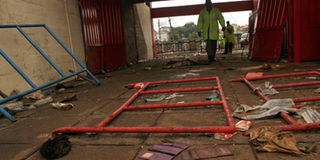Kenyan football: Deadly shame

The gate where the stampede occurred aat Nyayo National Stadium on Saturday evening. Photo/ELVIS OGINA
The death of seven football fans at Nyayo National Stadium has exposed safety lapses by stadium managers, club officials and fans.
Stadium managers appear to have delegated safety to Gor Mahia officials and fans, raising the question of who really is in charge during such big matches.
Gor Mahia fans, superstitious as all sports fans tend to be, regard gate number two as their lucky one and believe that using any other leads to inevitable defeat.
Nyayo Stadium has 15 gates, two reserved for the teams and three for the main stand, leaving 10 for use by fans.
Six gates used
On the fateful night, the stadium management wanted six gates used, in the end only three were. Gor Mahia — the “home club” — was supposed to use gates 3 and 2. But the superstitious fans would only use gate 2 and no other.
AFC Leopards — the “visiting team” — was allocated Gates 9 and 10. “We had planned to have six gates to be used, but the host club, Gor, opted to use only three. In fact, when I saw the crowds building, I advised some of the fans to use the next gate (gate 3) as it was less busy, but they refused,” said Ms Lilian Nzile, the Nyayo Stadium manager.
Stadia Management Board boss Benjamin Sogomo said some fans were categorical that gate 2 was their “own” and would not use any other. As the 7pm kick-off approached, the crowd swelled and became impatient, waving their tickets and clamouring to get in.
“I’m meant to understand that the fans at gate “number 2” were told to move to the next gate, but refused,” said Mr Sogomo.
“Some even said: “hii ni gate yetu” (this is our gate) and went ahead to surge and push.”
Safely admitting fans
The authorities had no plan for safely admitting fans into the stadium, allowing them and their clubs the freedom to choose what gates to use, or not to use, irrespective the numbers waiting to get in.
Police, whose bosses claimed to have deployed 285 officers and a 100-strong riot squad, also appeared to have been unprepared for a stampede.
By the kick-off time, the Gor crowd, which is neither the most disciplined nor the most patient at the best of times, was restless, shoving and pushing and before long the fans surged forward, begging to be let in.
Total bedlam ensued, those nearest the gate were crushed to death. In the aftermath, neither the few police officers on duty nor the Red Cross team took charge, the rescue was as chaotic as the stampede. Some died because the ambulance couldn’t reach them.
On Saturday, four bodies of victims at the City Mortuary were identified as 21-year-old Railways Training Institute student Winfred Karimi Kinyua, Kenyatta National Hospital-based taxi driver David Ochieng, Stephen Ochieng Onyango and Franklin Onimu Kiribwa.
Those treated at KNH and discharged were John Ooko, Albert Owanga, Paul Nthenge, Washington Owuor, Jackson Oduor, Kennedy Odhiambo and Jimmy Odhiambo.
Two others who were not identified were treated at KNH late in the night and discharged while one person was admitted to Menelik hospital, according to police.
One person undergoing treatment at KNH reportedly ran away after doctors at the Casualty department referred him to X-Ray. Two other injured persons, Steve Oduor and Newton Otieno, were treated at the Nairobi Hospital.
Former AFC Leopard goalkeeper Matthews “Ottomax” Owino tried to have the match stopped but Gor Mahia officials thought he had invaded the field and gave him a thorough beating.
Police officers are said to have wept. Shocked but too few to do anything, they resorted to asking Mr Owino and a group of fans to invade the pitch.
“Our mission was to convince the match officials to stop the game and request for help to save the injured,” Mr Owino said.
On Sunday, Gor Mahia officials were in a crisis meeting. Club chairman Ambrose Rachier said the stampede was “not caused by crowd trouble” but due to the anxiety building up among fans outside as minutes ticked towards the start of the game.
AFC Leopards secretary-general Robert Asembo, who visited KNH and the City Mortuary on Sunday, sent condolences to the families of those who died and wished the injured a quick recovery. “ I hope lessons will be learnt from Saturday’s happenings,” he said.
Reports by Odindo Ayieko, Nyambega Gisesa, Sammy Kitula, Walter Menya, Dominic Wabala and Walter Menya




